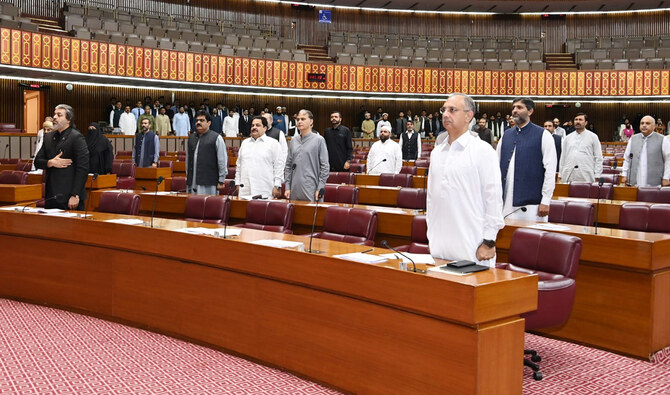ISLAMABAD: Ten lawmakers from former prime minister Imran Khan’s Pakistan Tehreek-e-Insaf (PTI) party, who the PTI says were arrested from inside the parliament building earlier this week, were produced at the National Assembly on Thursday on the orders of the Speaker, the party said.
Pakistani police arrested several PTI MPs late on Monday night and early on Tuesday after the party held a rally in the capital on Sunday to demand the release of ex-PM Khan, who has been in prison since August last year, facing a slew of cases. The PTI said a number of the MPs were detained while they were inside the parliament building. The National Assembly speaker on Tuesday opened an inquiry into the arrests, citing that under Pakistani law, legislators cannot be detained from within the precincts of the parliament without the speaker’s permission.
According to the National Assembly Secretariat, production orders were issued on Wednesday for PTI party MPs Sher Afzal Khan, Malik Muhammad Aamir Dogar, Muhammad Ahmad Chattha, Makhdoom Zain Hussain Qureshi, Waqas Akram, Zubair Khan Wazir, Awais Haider Jakhar, Syed Shah Ahad Ali Shah, Nasim Ali Shah, and Yousaf Khan.
Upon arriving at the Parliament House, all the lawmakers were handed over to the sergeant-at-arms.
“Slogans of former prime minister Imran Khan chanted on the arrival of PTI members at the Parliament House,” the PTI party said on Thursday in a social media post on X.
Videos shared by the PTI with journalists showed the arrested lawmakers arriving at the National Assembly in a white van surrounded by police personnel amid pro-Khan sloganeering. One video showed Marwat meeting his son while one had Dogar speaking against what he described as the “fascism” of the incumbent government. Qureshi told reporters none of the arrested PTI leaders were tortured while in custody.
On Wednesday, the PTI had announced its lawmakers would boycott parliament sessions until it was “satisfied” with the result of an investigation into the arrests.
Separately, a two-member bench of the Islamabad High Court bench suspended the physical remand of the arrested PTI party lawmakers till the next hearing, which is scheduled for tomorrow, Friday. An anti-terrorism court on Tuesday allowed the eight-day physical remand of the politicians.
Following uproar over the arrests, the National Assembly unanimously adopted a resolution on Wednesday to constitute an 18-member committee to resolve issues related to the House. The PTI is represented in the body by its chairman, Gohar Ali Khan.
SUNDAY RALLY
Sunday’s PTI rally was mostly peaceful, but there were clashes between police and some PTI supporters en route to the rally venue, in which one police officer was injured. The rally also went on longer than the 7pm deadline given by the district administration, a violation under the recently passed Peaceful Assembly and Public Order Act, 2024, which allows authorities to set time limits for public gatherings and designate special areas to hold them.
The Islamabad administration had allowed the PTI to hold Sunday’s rally from 4pm till 7pm but the gathering went on until nearly 11pm. Police have said the PTI MPs were detained over violations of the new law.
On Wednesday, Information Minister Ataullah Tarar rejected PTI party claims that the lawmakers were arrested from inside the National Assembly building.
The PTI says it has faced an over year-long crackdown since protesters allegedly linked to the party attacked and damaged government and military installations on May 9, 2023, after Khan’s brief arrest that day in a land graft case. Hundreds of PTI followers and leaders were arrested following the riots and many remain behind bars as they await trial. The military, which says Khan and his party were behind the attacks, has also initiated army court trials of at least 103 people accused of involvement in the violence.
The party says it was not allowed to campaign freely ahead of the Feb. 9 general election, a vote marred by a mobile Internet shutdown on election day and unusually delayed results, leading to accusations that it was rigged and drawing concern from rights groups and foreign governments.
The PTI says it won the most seats, but its mandate was “stolen” by PM Shebaz Sharif’s coalition government which formed the government with the backing of the all-powerful military. Both deny the claim.
Khan, jailed since last August, was ousted from the PM’s office in 2022 in a parliamentary vote of no confidence after what is widely believed to be a falling out with Pakistan’s powerful military, which denies being involved in politics. Since his removal, Khan and his party have waged an unprecedented campaign of defiance against the military and now the PTI is aiming to mobilize the public through public rallies to call for their leader’s release from jail in “politically motivated” cases.
The ex-PM faces a range of legal charges and was convicted in four cases since he was first taken into custody, all of which have been either suspended or overturned by the courts. He remains in jail, however, on new charges brought by Pakistan’s national accountability watchdog regarding the illegal sale of gifts from a state repository while Khan was prime minister from 2018 to 2022.
















